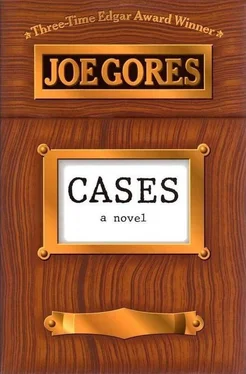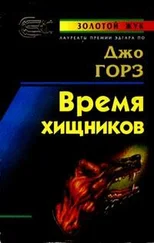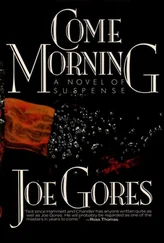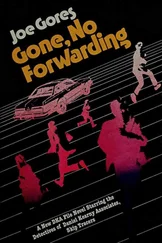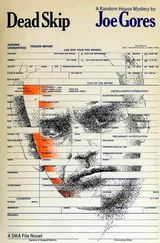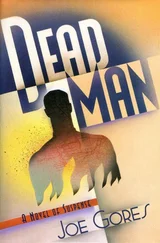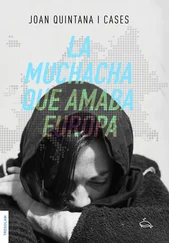“Uncle Ben heard anything yet?” Gus’s uncle had heavy connections with the Los Angeles Catholic Archdiocese.
“I bet he’ll have the word tonight.”
These six hundred fantasyland acres of death were brilliant green, dazzling with flowers; in the distance, buildings gleamed like the Emerald City of Oz. Tomorrow the place would be full of tourists and people paying their respects; children would romp through Lullaby Land where dead children were buried amid hearts of living flowers and gingerbread castles with stone turrets.
“Why’d you want to work in a place like this?” asked Gus.
“I read a novel about it at Notre Dame. The Loved One. ”
Uncle Ben was out watering the lawn, a tall leathery man with thin features and dark hair with gray wings swept back over his ears. During the 1936 Berlin Olympics he had taken bronze in the breast-stroke. He turned the hose on them.
“You two bums are in luck!” he yelled. “You start work Monday out at the San Fernando Mission’s new seminary complex!”
Thoroughly drenched, they fled into the kitchen. Aunt Pearl was mincing onions, tears glinting on her plump cheeks despite a slice of bread between her teeth to stop the fumes.
She made shooing gestures, a housewife driving chickens from her kitchen. “You’re soaking wet! Go on, get out of here!”
Grandma Trabert had lived in this house as bride, wife, and widow for fifty years, now spent most of her time in what once had been her sewing room. She was dwarfed by her huge leather armchair in front of the TV with its bunny ears and round eight-inch screen. A gun went off on the TV.
“Just the facts, ma’am,” said Gus.
“What day is it today?” asked Grandma in her sweet old lady’s voice as stern dum-de-dum-dum theme music came up.
“Friday, Grandma Trabert,” said Dunc.
“Joe Friday,” snickered Gus too softly for Grandma to hear.
A man wearing a cap with a star on it was holding a gas hose in his hand and urging his viewers to use Texaco Sky Chief gasoline with Petrox for maximum power plus engine protection.
“No, no, dear. The date.”
“The twenty-fourth. Of July.”
“Oh, boys, how exciting! Only two days to St. Anne’s Day. My patron saint! We’ll have such a good time! Don’t oversleep! I want you to hear the music at High Mass, Gus — you too, Dunc. The choir is so wonderful since Mr. Spinelli came to us.”
Gus winked at Dunc over her head. “Sure thing, Grandma.”
Actually Gus wanted to try and get into the pants of a trailer park gal out at the beach who belonged to a cult called the Seven Priests of Melchizedek. The priest, Gus said, would be great for Dunc’s notebook. He hadn’t written a word since Vegas.
Grandma Trabert called after them over the television, “I’m going to start praying right now that you boys don’t have to work with a bunch of niggers and spics out there at the mission.”
A huge Dutch windmill marked Van de Kamps bakery at the corner of Fletcher and San Fernando; if you wanted to eat inside on a Friday night, you stood in line for an hour. They preferred the drive-in; it had been one of the world’s first after the war, and featured young pretty carhops in tight clothes.
A teenage brunette took their orders. As they watched her backside twitch busily away, Gus said, “Paint a ‘W’ on each cheek, when she bends over — WOW!”
She returned with trays she hooked over the insides of their open windows and braced against the doors below. They munched cheeseburgers and fries and slurped chocolate malts.
Dunc had to talk with Pepe about that last terrible night; he sure couldn’t talk to Gus about it. So he said, “I met a piano player in Vegas who said he’d be playing on the Sunset Strip. Let’s go try to find him.”
“Better than Van de Kamps,” said Gus.
Sunset Strip on Friday night was Glitter Gulch without casinos. An unending stream of cars drove each way on the wide boulevard with lights flashing, horns braying, guys hanging out of windows to shout and whistle trying to attract girls. Some of the clubs were big and brightly lit, with marquees and floor shows and valet parking for gleaming expensive cars disgorging men in suits and women in gowns. Others were small and dim.
Pepe could be playing in any of them, alone or in a combo. No wonder he had been so cynical about Dunc finding him. By 1:30 in the morning they were bleary-eyed over draft beer in a little bar with nobody else there except a tough-looking bartender washing glasses and listening to Eddie Fisher’s throbbing overamped “I’m Walking Behind You” on the jukebox. Maybe if Dunc had been walking behind Artis that night, or beside Ned when he’d gone up against Carny Largo...
“Gimme the goddamn keys,” growled Gus in his ear, holding out his hand. “I’m driving home.”
“Smooth move, Ex-Lax,” agreed the bartender.
Dunc surrendered the keys, realizing with mild surprise that he was a little drunk. The night had been a busted flush. Maybe tomorrow at the beach everything would be different...
“I’m going to Mexico for my vacation.” Fayme had scraggly blond hair and a white blouse tied up to show her middle; faded loose blue shorts did nothing for her legs. “Look for a little talent.” She winked at Angela. “Why don’t you come along?”
Angela looked good in her tight swimsuit, but like Fayme was past thirty. In her lap was a little hairy dog named Muffy.
She gestured with her glass. “What about Muffy?”
“Leave him here with Birdie. Or at a kennel.”
“It would be no vacation without my Muffy,” said Angela.
The trailer court was on a low dusty hill where the rumble of Coast Highway I traffic from above merged with the mutter of the sea from below. They were sprawled in deck chairs under a canvas awning, drinking cold beer from beaded bottles.
Birdie leaned forward. “Joyce took her two Chihuahuas to Mexico last year and they both nearly died of the heat.”
Birdie was really old, over forty, with a pixie face full of wrinkles, and an amazing body under a clinging light blue one-piece dress. Gus had his deck chair hiked close to hers.
“Isn’t Joyce still down there?” asked Angela.
“Mexico City. But she lost her student permit.”
Birdie gave a throaty chuckle. “I didn’t know you needed a permit for what she’s been doing — not in Mexico anyway.”
A man came out of a trailer three doors down. He was tall, boxy, about fifty, wide in the body, a sack of stomach pushing out under his blue-and-white-striped sport shirt. Sandy hair straggled across his bulbous forehead.
“This is Hector,” said Birdie. She added, “My husband,” as if both surprised and distressed by the fact. “Gus you’ve met. This is Dunc Are you joining us?”
“Ahhh... no! I’m going to see my son.”
“Will you be back tonight?”
Without answering her, he ambled off along the sandy path that angled up toward the parking lot beside the highway.
Gus put his hand on Birdie’s thigh. “I didn’t know you had a son.” She removed the hand.
“ His son — from wife number one. I’m wife number three. And he’s lying, he never goes to see the smart-ass little brat”
Gus wanted to get laid, but Dunc couldn’t listen to any more inanities for a while. “I’m going down to the beach.”
“Leave the car keys,” Gus called quickly, “and money.”
Dunc did. The narrow trail wound about, over, and down between dirt hummocks covered with low wiry vegetation.
He relieved himself against the side of a dune, writing the opening of Ulysses in the sand until he ran out of urine on the “g” of “Mulligan.” The beach, churned with footprints, was as deserted as if the bomb had fallen. He tried to imagine that searing whiteness against his eyeballs, and thought of Artis.
Читать дальше
